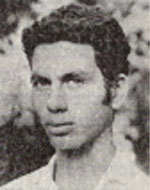Eliahu, son of Victoria and Menachem, was born on October 18, 1953. He studied at the Merkaz Elementary School in Ramat Gan, at ORT in Ramat Gan, and at the Ha-Chugim High School in Kibbutz Beit Hashita. Eliahu, who immigrated to Israel from Persia in Ramat Gan, began his studies in elementary school, but began to study electronics at a vocational high school, but under the influence of his older brother he joined Kibbutz Beit Hashita and later joined Eliyahu, who was soon absorbed in the life of the kibbutz and his classmates, was very successful in his studies and liked his classmates, even though he was an urbanist who was “captured” by a kibbutznik He was active in all areas of sports and social activity, like the rest of his friends, but only two years later he was at Beit Hashita, but this period had a profound impact on him. Home to help his parents support the family. But the kibbutz members convinced him that if he finished his studies at Beit Hashita, he would be very pleased with his parents. He responded to them and continued until the twelfth grade with his classmates, and Eliahu’s most prominent qualities were optimism and cordiality, and he trusted people, sometimes to the point of innocence, did not hold a grudge against anyone and was cheerful and exalted. And declared confidently that he was determined to remain in the market after serving in the IDF. At the same time, however, he was disturbed by the separation from home, and especially from the parents, who was deeply attached to them. How to be at Beit Hashita and at home in Ramat Gan as one was the difficult question before him, and enlisting in the army served as a test period for him, at the end of which he hoped to find a solution to his dilemmas. Eliahu was drafted into the Israel Defense Forces in early November 1971. After completing basic training, he completed a tank training course and became a crewman and a gunner in the Centurion tank, where he was considered an outstanding soldier, dedicated and loyal, He was also nicknamed “Hunter 2.” He acquired his first combat experience in one of the IDF operations in Lebanon. He excelled in this raid, but returned to Israel carrying the body of his friend who had fallen in action in his tank, and the death of his friend caused him pain and deep sorrow. During the years of his military service, Eliahu divided the vacations between his home in Kibbutz Beit Hashita and his adoptive parents there and the home of the parents, brothers and sisters in Ramat Gan. Because he served mainly in the Golan Heights, he brought stones from his parents’ home so that they could know where he had served, and in the many postcards and letters he sent, he wrote about his experiences in the army. During the Yom Kippur War, Eliyahu served in an armored unit in the Golan Heights and fought in all the battles in the central and southern sectors. His tank destroyed many Syrian tanks and blocked Syrian forces, which broke out in the area of Hosaniya. He participated in the beginning of the counterattack into Syrian territory, and in the battle of Tel al-Ahmar on October 11, 1973, he was hit and killed with all his tank crew. He was brought to eternal rest in the Kiryat Shaul cemetery, leaving behind his parents and six brothers and sisters. After his fall, he was promoted to sergeant. In a letter of condolence to the bereaved family, his commander wrote that Eliyahu was an excellent gunner and among the soldiers in his unit. Words about the figure of Eliahu were published in two pamphlets, “Pnei Heveri” and “Micha, Eli,” published by Kibbutz Beit Hashita in commemoration of the eleven kibbutz members who fell in the Yom Kippur War.
